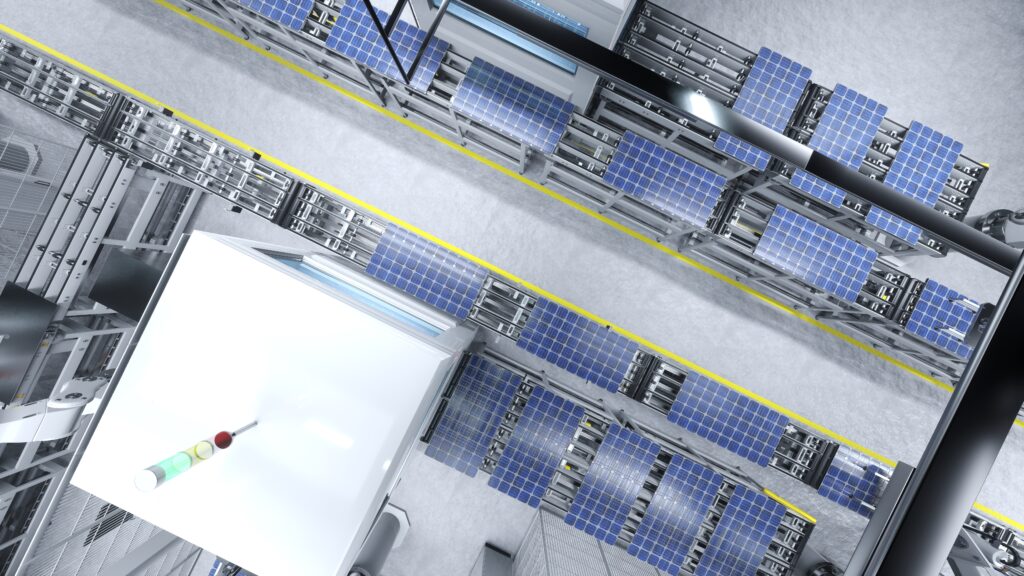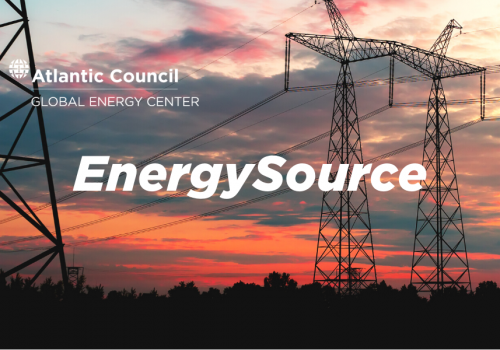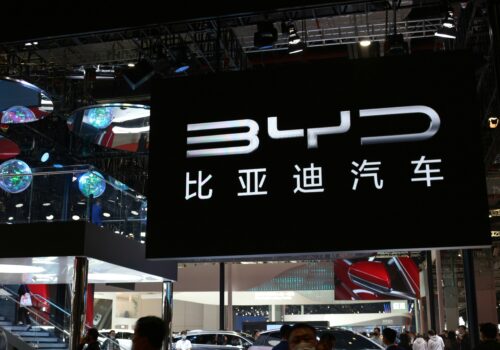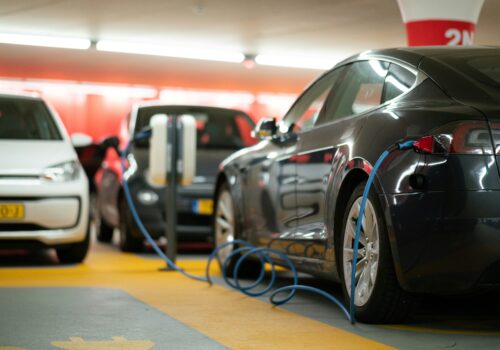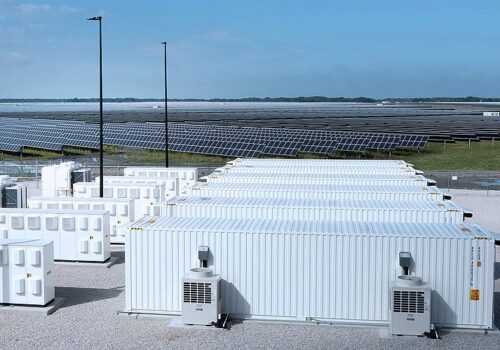China is counting on three cleantech sectors to fuel future economic growth: electric vehicles (EVs), lithium-ion batteries, and solar photovoltaic (PV) panels. Exports of these so-called “new three” industries reached nearly $143 billion in 2023, up massively from $33 billion in 2019.
But China’s growing might in cleantech is stirring unease in recipient markets due to perceived economic and national security risks. The United States has all but banned imports of Chinese solar cells and modules, and EVs. Other advanced economies may follow suit—for example, on August 26, Canada imposed tariffs on Chinese-made products.
With several developed countries becoming increasingly reluctant to absorb imports from China’s new three industries, China’s cleantech sectors need alternative markets to secure future export growth. Accordingly, Latin American’s approach to China’s cleantech industries could prove consequential. For now, growth in China-Latin America ties in the “new three” is driven primarily by Brazil, although electric vehicle shipments to the South American country have softened considerably in recent months.
STAY CONNECTED
Sign up for PowerPlay, the Atlantic Council’s bimonthly newsletter keeping you up to date on all facets of the energy transition.
China’s Brazil bonanza
New three exports to continental Latin America have surged. The region’s total imports of Chinese solar panels, lithium-ion batteries, and solar PV rose from $3.2 billion in 2019 to $8.9 billion in 2023, with Brazil absorbing 63 percent of these imports by value last year.
Exports of the new three are relatively minor compared to China’s total exports to the region, which nearly reached $230 billion in 2023. Altogether, continental Latin America accounted for 10 percent of China’s exports of the new three for the twelve months ending August 2024. The region features, however, as one of the options China is presented with to find a market for its exports amid rising manufacturing capacity domestically.
Electric vehicles are where Brazil’s outsized purchases of the new three are most striking. For the twelve months ending in August 2024, 73 percent of China’s exports of battery electric and plug-in hybrid vehicles to continental Latin America were directed toward Brazil.
Interestingly, there has been a sharp decline in EV exports to Brazil in recent months, while shipments to Mexico are rising sharply. Some of the recent decline is due to sales being brought forward to avoid an 18 percent tariff imposed by Brazil in July.
The same trend may be observed in Mexico, as its rising imports of Chinese EVs are likely tied to the phase out of a tariff exemption on October 1. Still, rising shipments to Mexico could also signal the start of a larger trend. Importantly, BYD is, for now pausing investment plans in the country.
Brazil’s market advantage
China’s apparent focus on Brazil for new three exports can be attributed to the size of the Brazilian market, strong environmental and policy fundamentals, and the influence of Beijing’s trade and investment diplomacy.
Brazil’s gross domestic product (GDP) measured $2.2 trillion in 2023, accounting for 34 percent of continental Latin America’s GDP. In a regulation-heavy region, China needs to prioritize markets for its early-stage exports.
In addition to Brazil’s size, the country is a favorable location for clean industry. Brazil is fertile ground for solar power, enjoying high solar irradiance in nearly all regions of the country. Since 2017, Brazil has added an average of 1 gigawatt per month of combined solar capacity in residential and utility-scale projects. The average price of solar electricity in the country has decreased by 68.6 percent since 2013, making it among the most competitive generation sources on the grid.
Brazilian policy supports domestic deployment of clean energy—and thus new three imports from China. Brazil provides import tax credits for electric vehicles, and has an emissions standards program known as Proconve, which mandates emissions limits for harmful pollutants. By extension, this program also incentivizes battery deployment, since electric vehicles perform well under this scheme.
The country has long-established solar support mechanism through its ProInfa tax credit scheme, and BNDES, the national development bank, provides cheap project finance. Brazil also incentivizes residential solar through a net-metering policy. Few other Latin American nations combine such sophisticated policy frameworks with favorable financing conditions, a key enabler of investment in a region beset with high interest rates. These policies have made Brazil an attractive market for Chinese cleantech firms.
Finally, China views Brazil as a valuable diplomatic partner in South America, and the relationship could provide Beijing a regional foothold. Brazil is also an important economic partner—in Latin America, it is China’s largest trading partner and the largest recipient of Chinese investment. Globally, Brazil is China’s principal source of soybeans and second-largest source of iron ore, which are central to China’s livestock and steelmaking industries, respectively. China is, in turn, a critical export market for Brazil.
Brazil’s policy tightrope
However, Brazilian policymakers face a dilemma in their economic relationship with China. To spur productivity growth needed to boost real wages, Brazil would benefit from moving up the value chain for its exports.
In 2021, capital, consumer, and intermediate goods accounted for 93 percent of Brazil’s total goods imports, while raw materials represented 55.7 percent of Brazil’s goods exports. Brazil’s trade specialization in raw materials and lesser value-added goods has only increased over time—manufacturing’s share of GDP has shrunk by 23 percent since 1980. For this reason, re-industrialization was recently cited as “essential” for Brazil’s growth by its minister of labor and employment, with the energy transition counted as one of the six pillars of Brazil’s new industrial policy plan.
Brazil has sought to invest in domestic production rather than imports. During Vice President Geraldo Alckmin’s recent trip to China, he obtained commitments for nearly $5 billion in infrastructure investment. While Chinese commitments do not always pan out, they do signal diplomatic intent.
Additionally, Brazilian diplomacy coaxed Chinese EV manufacturer BYD to invest in a facility in Bahia—at the site of a closed Ford plant—BYD’s first such establishment abroad. Still, Brazil has a vested interest to ensure the Chinese market remains open to their exports of raw materials. This means the Brazilian government is not likely to take a confrontational approach on trade, which limits its ability to alter the nature of its economic relationship with China.
Brazil’s posture toward Chinese cleantech imports must balance competing interests. Cheap cleantech could provide low-cost equipment to expand the grid and accelerate decarbonization, all while providing short-term economic benefits. On the other hand, unfettered imports could weaken domestic manufacturing and give Chinese companies monopolistic leverage they could exploit.
Additionally, while there is little risk from “dumb” solar panels and lithium-ion batteries that do not connect to the web, Chinese-made Internet-connected vehicles pose potential security threats. Brazil, a major non-NATO ally, and other Latin American countries can mitigate economic and security dangers by ensuring that Chinese firms site production locally and share source code for connected vehicles. Additionally, Latin American countries could ban “over-the-air” software updates for Chinese EVs, or otherwise airgap them from the Internet.
Brazil, China, and the new three
As Chinese goods increasingly face scrutiny across North America, Europe, and other markets, the Brazilian market will loom larger as an alternative. China’s economic ties with Brazil are an inescapable reality, but Brasília should ensure the relationship serves its own objectives and does not inculcate dependency. Policymakers in Washington should also elevate Brazil as a strategic commercial partner, and work with the private sector to offer a credible, competitive alternative to Chinese cleantech.
Joseph Webster is a senior fellow at the Atlantic Council Global Energy Center.
William Tobin is an assistant director at the Global Energy Center.
This article reflects their own personal opinions.
MEET THE AUTHORS
RELATED CONTENT
OUR WORK

The Global Energy Center develops and promotes pragmatic and nonpartisan policy solutions designed to advance global energy security, enhance economic opportunity, and accelerate pathways to net-zero emissions.
Image: Aerial shot of photovoltaics in eco friendly warehouse 3D illustration. October 1, 2024. DC Studio
